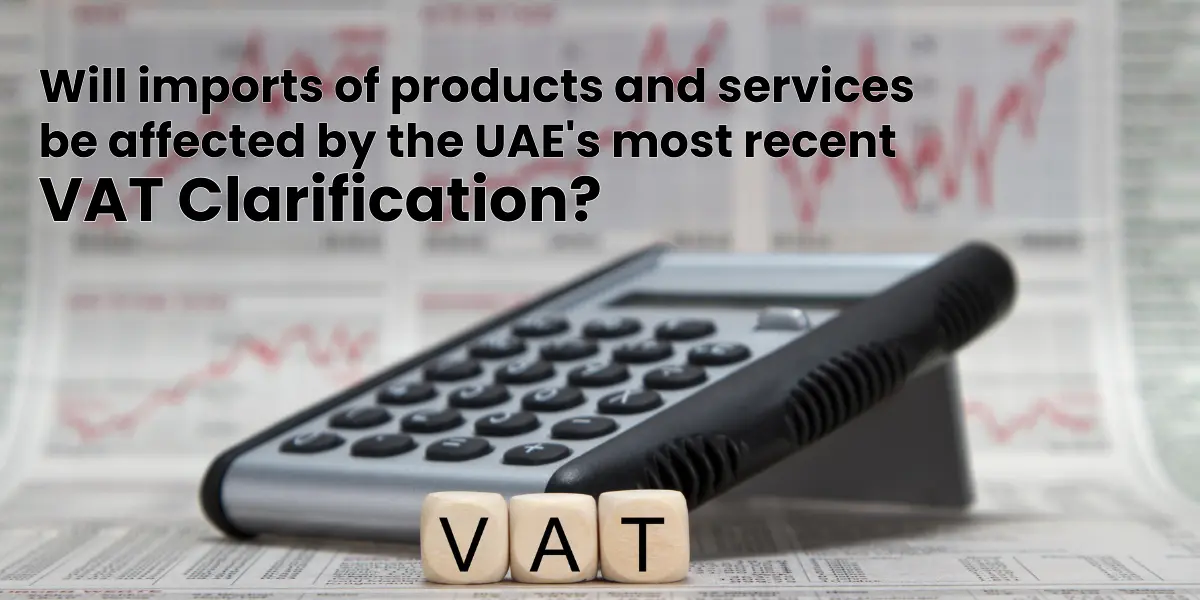
Will the UAE's recent VAT Clarification Affect Imports?
Businesses are looking for more information on submitting tax invoices as a result of the new VAT clarification.
Businesses in the UAE, both on the mainland and in the free zone, appear to have been taken by surprise by a recent VAT clarification. A recent public clarification (VATP041), which replaced the previous VATP036 and addresses the “reverse charge mechanism” (RCM), addresses how UAE financial institutions import SWIFT services and account for VAT on them.
Financial institutions in the UAE are seen as providing a taxable supply of these SWIFT services to themselves since they are imports. According to the clarification provided by VATP041, these businesses must provide a proper tax invoice to themselves for every SWIFT transaction in addition to being accountable for all applicable VAT responsibilities under RCM. There are conditional exceptions available.
According to Art. 48 of the VAT Decree Law, a “simplified” tax invoice rather than a “full” tax invoice cannot be issued in cases where RCM is applicable, per a recent revision to the VAT executive regulations. Among other things, Article 48 addresses electronic equipment, precious metals, jewelry, and domestic supplies (inside the United Arab Emirates) of prescribed crude oil, etc.
Recovery from input taxes and SWIFT communications
Input credit for VAT paid under RCM (on goods and services) is permitted upon “receiving” and keeping invoices as of January 1, 2023. For the SWIFT services, the international banking system exchanges SWIFT messages rather than invoices. It is unlikely that foreign banks will send out invoices for every SWIFT transaction.
The UAE financial institutions’ ability to recover input taxes may have been compromised by the lack of supplier invoices. Originally published in 2024, the clarification permits eligible SWIFT messages to be used as supporting documentation for the recovery of input tax on VAT paid under RCM.

The quantity of invoices
The clarification permits a conditional exemption from producing tax invoices and acknowledges the administrative difficulty placed on UAE financial institutions by having to issue tax invoices to themselves for a large number of SWIFT transactions.
For SWIFT transactions, it may be improbable that a large number of tax bills will be sent to oneself.
Instead of issuing separate tax invoices for each supply made to the same individual, UAE VAT laws now let a provider to send a single monthly “summary” tax invoice. For example, monthly tax bills for energy, mobile, bank costs, and so on.
A single summary tax invoice should be accepted for monthly imports, including SWIFT services, since UAE financial institutions are seen as providing taxable supplies to themselves (i.e., the same individual).
Accounting, exchange rates and e-invoicing
In addition to getting invoices from foreign suppliers, accounting for tax invoices issued to oneself may also provide an ERP/accounting software hurdle if it applies to all imports. The accounting of the invoices from foreign suppliers would be required by the company tax regulations.
Would the customs authorities’ rate still be appropriate for the import of goods? It has been made clear that under the planned e-invoicing regime, taxpayers will not be required to declare import transactions for goods and services when they receive invoices from overseas suppliers.
Businesses are urged to ask the Federal Tax Authority (FTA) for a private explanation or administrative exemption when it comes to sending tax invoices to themselves for the importation of goods and services, among other solutions. The resources of FTA may be impacted by a surge of such applications. Administratively and monetarily, the entire business sector may benefit from a general clarity.
